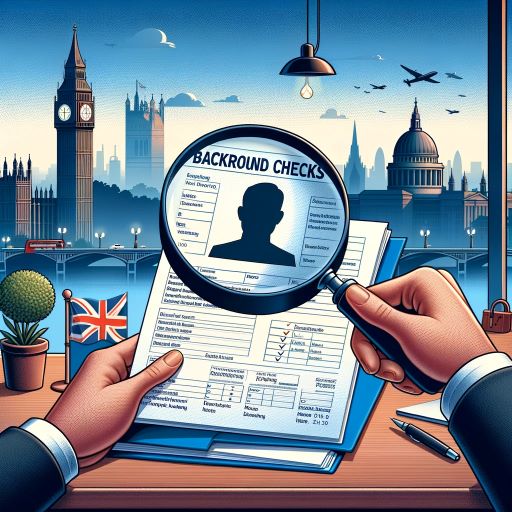

The primary purpose of BPSS checks is to establish a reliable baseline of security clearance for individuals to ensure they meet specific standards of trustworthiness, integrity, and reliability. By screening candidates before employment, organizations mitigate risks associated with unauthorized access to sensitive information, corruption, and potential threats to public safety.
Providing a valid passport or driver's license is essential for verifying your identity when applying for BPSS clearance. These documents serve as primary forms of identification and are vital in confirming who you are.
Checking criminal records focuses on unspent convictions, evaluating an individual's trustworthiness. Confirming employment history validates the accuracy and truthfulness of the past three years of work or activity.
Coordinating with overseas authorities for document verification and background checks adds another layer of difficulty, extending the time required for completion. Addressing inconsistencies or gaps in the information provided by the individual undergoing BPSS clearance may necessitate additional time and effort to resolve.
It's essential to be forthcoming with this information to facilitate a smooth and thorough BPSS clearance process.
Moreover, digital technology supports ongoing monitoring and updating of BPSS clearances. Once an individual has been vetted, their information can be continuously checked against updated databases for any changes that might affect their security status, such as new criminal records or changes in financial status, ensuring ongoing compliance with security standards.
These screenings affirm identity, employment history, national and immigration status, criminal record, and time spent abroad. Individuals needing access to UK OFFICIAL assets and occasional access to UK SECRET assets must undergo BPSS screening to uphold trustworthiness, honesty, and integrity in their roles.
The right to work check under BPSS serves as a legal safeguard that prevents illegal employment. In the UK, it's mandatory for employers to ensure that their employees have the legal right to work before commencing employment. Failure to verify this can lead to severe penalties, fines, and reputational damage for the organization if they are found to be employing someone illegally.
- Highlight any security-sensitive activities or exposures encountered while abroad.
Depending on the severity and nature of the crime, certain offenses may disqualify individuals from obtaining BPSS clearance. It's paramount to be transparent and disclose any unspent criminal records when applying for BPSS to uphold integrity. Individuals with unspent criminal records may face additional scrutiny or even be rendered ineligible for roles requiring BPSS clearance.
Generally, a BPSS check can take anywhere from two weeks to a month to complete. This timeframe assumes that there are no complications, such as discrepancies in the information provided or delays in receiving necessary documents from third parties.
Providing evidence of at least three years of employment history is an important requirement for BPSS clearance. HMRC tax records and National Insurance contributions can be used to validate your employment history.


For roles where exposure to SECRET and TOP SECRET information is possible, BPSS clearance becomes even more significant in safeguarding classified data.
A criminal record check is conducted to ascertain if the individual has any convictions that might be relevant to their suitability for the position. For BPSS checks, this usually involves a basic disclosure that reveals unspent convictions, providing an insight into the individual's legal compliance and integrity.
The verification of essential documents plays a pivotal role in the recruitment process requirements for obtaining BPSS clearance. To guarantee a thorough evaluation of candidates, organizations typically follow these steps:Applicants need to provide documents like a passport or driver's license to confirm their identity.
Cloud technology plays a pivotal role in the BPSS process by providing a centralized platform for storing and accessing data across different locations and devices securely. This facilitates seamless collaboration among HR, security departments, and external vetting agencies, making the process more efficient and less susceptible to delays caused by geographic and temporal barriers.
1. **International Background Checks:** Expect a growing emphasis on international screenings to guarantee thorough vetting for BPSS compliance.
Military personnel, from soldiers to strategists, also require BPSS clearance due to their access to classified military operations and strategic information. The clearance is essential to safeguard national security and operational integrity within the armed forces.

By verifying your identity, legal right to work status, and employment history accuracy, organizations can establish a secure work environment and prevent unauthorized access to data. BPSS clearance is essential for individuals with access to government assets and sensitive information, as it confirms the honesty and integrity required for specific roles.
BPSS checks typically include four main elements: identity verification, employment history check, right to work confirmation, and a basic criminal record check. These components ensure that the individual is appropriately vetted for security-sensitive positions but do not delve into extensive criminal history unless necessary for the role.
To verify your employment history for BPSS clearance, make sure you have documentation such as PAYE records, HMRC tax records, payslips, P45, and P60. These documents are essential in demonstrating your work experience and financial records.
Individuals applying for jobs in government departments, civil service, or contractors that require access to sensitive information must obtain BPSS Clearance.
Personal details, employment history, nationality, and criminal record information are needed for BPSS Clearance.